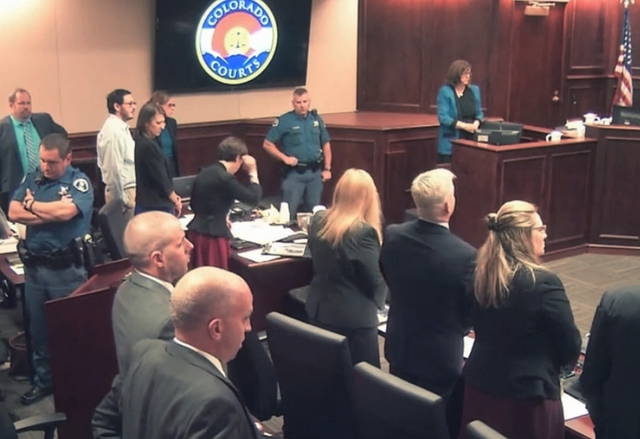Defense, DA argue reasons to spare Colorado gunman’s life

CENTENNIAL, Colo. — Defense attorneys for James Holmes made one more appeal for mercy Thursday for the Colorado movie theater shooter, urging jurors to consider his mental illness in his sentencing even though they rejected his claim of insanity when they found him guilty of murdering 12 people and trying to kill 70 others.
ADVERTISING
“Nothing we do here in this case is going to turn back the hands of time. And nothing we do will bring back those who died or heal the wounds of those who were injured,” said his lawyer, Tamara Brady.
“It was not about notoriety, it was not about hatred. It was about the delusion,” she said.
“The stressors triggered his psychosis, the psychosis caused him to be delusional, and come up with this plan to shoot people in this theater,” she said. “No one has said that Mr. Holmes is malingering or faking or exaggerating psychiatric symptoms. He is indisputably mentally ill.”
Brady acknowledged that prosecutors have tried to explain the “random and senseless crime” by describing a theory that Holmes methodically pursued a mission to kill.
“But the mere senselessness of it shows that it was psychotic. There was no political statement or religious statement or statement of any kind about what happened in that theater,” she said. “He didn’t send anything to the New York Times or The Denver Post. He sent his notebook to his psychiatrist. It had nothing to do with notoriety.”
District Attorney George Brauchler countered that Holmes wanted to increase his value by killing others, and it was because of that belief that he qualifies as schizophrenic.
“Is mental illness going to be a shield here to protect someone who had the capacity to make decisions?” the prosecutor asked. “Nobody in their right mind could plan the massacre of a theater full of human beings. We should take comfort in that. But not having the right mind does not protect you from the ramifications of your decisions.”
A woman interrupted the prosecutor, screaming “he’s wrong!” and “don’t kill him!” as she was pulled from the courtroom. Brauchler smoothly returned to his argument once the courtroom door closed, and the judge later told jurors to disregard the outburst.
After the jury left to deliberate, the judge described her as a homeless woman who had behaved herself until then. Prosecutors asked her to be held in contempt, while the defense said it would be more humane to hospitalize her as mentally ill. The judge said he would decide the matter later and wasn’t concerned that jurors were influenced by the episode.
Now each juror must decide if they see any reasons to override a potential death penalty and sentence Holmes to life without parole.
Judge Carlos A. Samour Jr. gave them lengthy instructions, detailing the evidence presented about Holmes’ childhood, his mental illness, his connections to people who love him and other potentially mitigating factors that would reduce his “moral culpability” and make him worthy of their mercy.
The jury unanimously agreed last week that the 2012 attack was cruel enough to justify the death penalty. If they decide the death penalty is still an option, they would move to a final phase in which they would hear from victims and survivors.
Samour said the jurors’ next move “is an individual decision and not a group decision.”
Each of the nine women and three men must give each aggravating and mitigating factor as much or as little weight as they alone determine, he said.
The jury convicted holmes of 24 death-penalty crimes because each of the 12 killings was given two counts, as 1st-degree murder “after deliberation” and “after extreme indifference.”
The judge reminded jurors that they already agreed that aspects his crimes justify capital punishment, including the fact that he killed multiple people, created a grave risk of death to others, acted in a cruel or depraved manner and laid in wait for his victims.
All jurors must agree that at least one count still justifies death before they can consider capital punishment in their final deliberations.
But he said Holmes has asserted factors that could point to mercy, including his age and emotional state at the time of the crime, his limited capacity to appreciate the wrongfulness of his conduct, his cooperation with authorities, and any other evidence introduced by his defense.
The judge enumerated more than 50 possible reasons the defense has offered for this mercy, including that all experts agree Holmes suffers from schizophrenia, is not faking the illness, and that the crimes would not have happened if he had been healthy.
“Holmes was genetically loaded to experience a psychotic disorder,” given the extensive history of schizophrenia on his father’s side of the family, the defense said.
They pointed to his prescription drugs, saying they could have increased his mania before the attack, and that he seems stable and non-expressive in the courtroom only because he remains on anti-psychotic and anti-depressive medicine to treat brain diseases for which there is no cure.
Holmes still struggles to explain, even years later, why his “mission” took such irrevocable control over his mind, they said. Committing the attack was not an act he enjoyed or took pleasure in, and despite the horrific crime, Holmes has friends and family who continue to love and care about him.
Brauchler mocked the defense efforts to show how Holmes had been a nice young boy.
“How many videos of him 8 years old and younger would it take to outweigh that horror?” he asked. “Nobody is born a mass-murderer. That happens later.”
He reminded them that Holmes fired four bullets into the body of his youngest victim as he showed them a picture of the 6-year-old girl.
“He made a decision to massacre, and he did; 12 dead from the community. Can anything outweigh that? No,” Brauchler said. His voice dropped to a whisper as he repeated, “No.”


